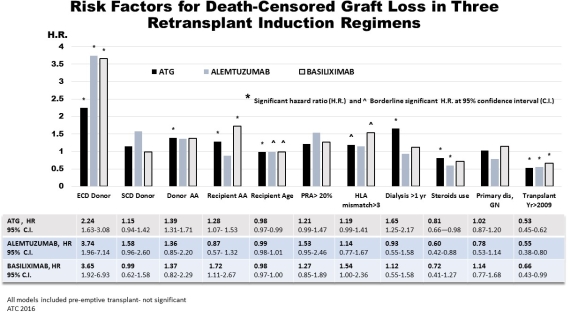Associations of Risk Factors and Kidney Retransplant Outcomes Vary Between Three Common Induction Agents: Results from the Analysis of Over Ten-Thousand Cases in Ten Years.
Medicine, University of Florida, Gainesville, FL.
Meeting: 2016 American Transplant Congress
Abstract number: 519
Keywords: Induction therapy, Kidney transplantation
Session Information
Session Name: Concurrent Session: Kidney: Induction Therapy 2
Session Type: Concurrent Session
Date: Tuesday, June 14, 2016
Session Time: 4:30pm-6:00pm
 Presentation Time: 4:54pm-5:06pm
Presentation Time: 4:54pm-5:06pm
Location: Room 312
BACKGROUND: There is no published study comparing the significance of risk factors for graft outcomes associated with common induction regimens combined with tacrolimus and mycophenolate maintenance regimen in kidney retransplants in US transplant centers.
METHODS: We retrospectively studied kidney-only retransplants in US adults (N=10 555) categorized according to induction: antithymocyte globulin (ATG),(N=7478), alemtuzumab(N=1390) and basiliximab(N=1687). Only cases maintained on tacrolimus and mycophenolate + steroids were included. We used Kaplan-Meier models to determine probabilities of patient survival and over-all, death-censored and rejection-free graft survival. We utilized Cox models to assess risk factors for acute rejection and death-censored graft loss (DCGL).
RESULTS: Three-year patient survival rates were 94.4% for ATG, 94.1% for alemtuzumab and 94.3% for basiliximab, (log-rank p=.89), (not shown). The adjusted hazard ratio (aHR) of acute rejection at one-year is lower for ATG or alemtuzumab versus basiliximab [(aHR=0.70, 95% Confidence interval (CI)=0.61-0.80, p<.001) and (aHR=0.62, 95% CI=0.51-0.76, P<.001); respectively], but did not differ between alemtuzumab and ATG(aHR=0.89, 95% CI=0.76-1.05, p=.16). The figure below depicts results of the Cox models for the risk factors (RF) for DCGL associated with each of the three induction cohorts. An expanded criteria deceased donor has the highest aHR for DCGL in all induction cohorts. Recipient black race is a significant RF for DCGL in the ATG or basiliximab, but not in the alemtuzumab cohort. Dialysis duration >1-year reached a statistical signficant aHR for DCGL only in the ATG cohort. Factors associated with a significantly decreased risk of DCGL in one or more of the induction cohorts are corticosteroids use, older recipient age, and retransplant year after 2009.
CONCLUSION: In the adult kidney retransplant recipients studied, the associations of some risk factors and graft outcomes vary between induction regimens: our results may be helpful in tailoring induction regimen for kidney retransplants.
CITATION INFORMATION: Santos A, Wen X, Casey M, Rehman S, Womer K. Associations of Risk Factors and Kidney Retransplant Outcomes Vary Between Three Common Induction Agents: Results from the Analysis of Over Ten-Thousand Cases in Ten Years. Am J Transplant. 2016;16 (suppl 3).
To cite this abstract in AMA style:
Santos A, Wen X, Casey M, Rehman S, Womer K. Associations of Risk Factors and Kidney Retransplant Outcomes Vary Between Three Common Induction Agents: Results from the Analysis of Over Ten-Thousand Cases in Ten Years. [abstract]. Am J Transplant. 2016; 16 (suppl 3). https://atcmeetingabstracts.com/abstract/associations-of-risk-factors-and-kidney-retransplant-outcomes-vary-between-three-common-induction-agents-results-from-the-analysis-of-over-ten-thousand-cases-in-ten-years/. Accessed July 13, 2025.« Back to 2016 American Transplant Congress
